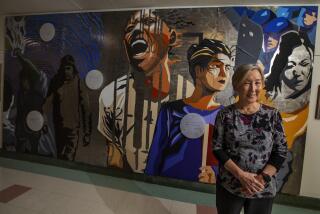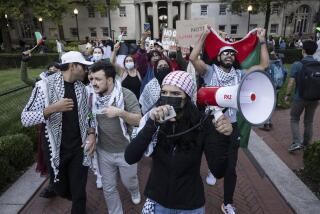Op-Ed: Studying the West’s ‘Great Books’ is made greater by the scholarship of international students
Nigeria, Moldova, Nepal, China — as dean of the Santa Fe, N.M., campus of St. John’s College I announce the home countries and names of all freshmen at our annual convocation ceremony. This year, more than 20% of them are citizens of other countries here on student visas. Ten years ago, almost none were. This growth caught our college by surprise, driven by a surge in interested students, not by targeted recruiting.
Their arrival is not just the most dramatic change in our students’ campus experience in the last 50 years — it’s a shift, or clarification, in the very meaning and purpose of liberal education.
I remember the moment I realized the implications of the change. In fall 2012, a Singaporean student at our “Great Books” college, Christine Kng, asked if she could write her capstone senior essay on Tocqueville’s “Democracy in America” and Sun Yat-sen’s “Three Principles of the People,” in order to explore how Tocqueville’s views of liberty and equality might be differently — more fully, perhaps — realized in the Chinese context.
For the first time since the 2008 recession, the number of visas issued to international students has decreased.
The founders of the program of study at our college could hardly have foreseen a student like Kng. Back in the 1930s, they abandoned specialization into majors to design an all-required, four-year course of study focused exclusively on Western texts that reflected the shared heritage and tradition of their American students. Our undergraduates are asked to read, discuss and interpret these texts directly, without the filter of secondary literature or professorial authorities.
Kng’s senior essay was a first of its kind for us: She combined a reading of a modern Chinese author — beyond the required texts of our program — with a reading of a seminal text of Western political philosophy. Her essay signified to me that the “Western” ideals of liberal education are no longer essentially Western. Every nation on Earth has been decisively touched by the movement toward greater social equality that Tocqueville identified as underlying democracy.
More broadly, Kng’s social, political and economic world, like my own, has been shaped by Hobbes and Rousseau, Hegel and Marx, even as her physics and technology have been shaped by Newton and Einstein. Of course, other cultures and traditions have their own distinct rich, nuanced perspectives on the roots of our shared modern world, but in 2019, there is no meaningful sense in which Western thinkers, texts and ideas are any more rightfully mine than hers.
One might go further and say the ideals of liberal education were never Western to begin with. The essence of philosophy has always been its claim that permanent scientific and ethical truths are accessible to all human beings. The international students who find St. John’s demonstrate this; they defy the stereotype of such students flooding our business schools and computer science departments because they prioritize economic success above all. Instead, at our college, they’re taking up a careful study of Plato’s “Republic,” Newton’s “Principia” and Kant’s “Critique of Pure Reason.”
In doing so they’re developing habits of mind of enduring relevance, and they’re stepping back from the deluge and transience of information in the digital age. They are realizing and renewing the deep power and promise of higher education, and they are reinvigorating our college with an overdue ethnic, cultural and linguistic diversity. Every day, they force our American students and faculty to revise an inherited map of the world into a more accurate and nuanced reflection of reality.
It’s not only St. John’s that has benefited. From 2010 to 2018, the enrollment of international students at U.S. colleges has increased to 1.1 million from 700,000. But current policy trends may reverse these gains.
Enter the Fray: First takes on the news of the minute »
For the first time since the 2008 recession, the number of visas issued to international students has decreased. In June, student visas were eliminated for certain types of Chinese students, and President Trump reportedly considered eliminating all of them. The administration’s approach to the H-1B visa process for skilled workers renders postgraduate career opportunities in America more doubtful. Prospective international students fear the prejudice and abuse that they may encounter amid high-profile anti-immigration enforcement and intensifying American xenophobia.
In May, I watched our international students pack their bags to go home for the summer. Two years ago, they would have said, “See you next year”; now some say, “Thank you and goodbye,” doubtful they will be able to secure another visa or unwilling to gamble with their future by returning. I leave it to others to audit the economic costs and risks of this brain drain. I lament the risk to the ideals of liberal education, ideals that lie at the heart of the “Western” and American democratic and humanist experiment.
We can hope that America’s inward turn is a passing moment and that politicians will listen to the chorus of voices in higher education that has been impressively unequivocal in its defense of our international students. It is in the nature of truth to defy the arbitrary exclusion of the other. The foundation of knowledge and education, especially liberal education, is that “nothing human is foreign to me.”
J. Walter Sterling is the dean of St. John’s College in Santa Fe, N.M.
Follow the Opinion section on Twitter @latimesopinionand Facebook
More to Read
A cure for the common opinion
Get thought-provoking perspectives with our weekly newsletter.
You may occasionally receive promotional content from the Los Angeles Times.





